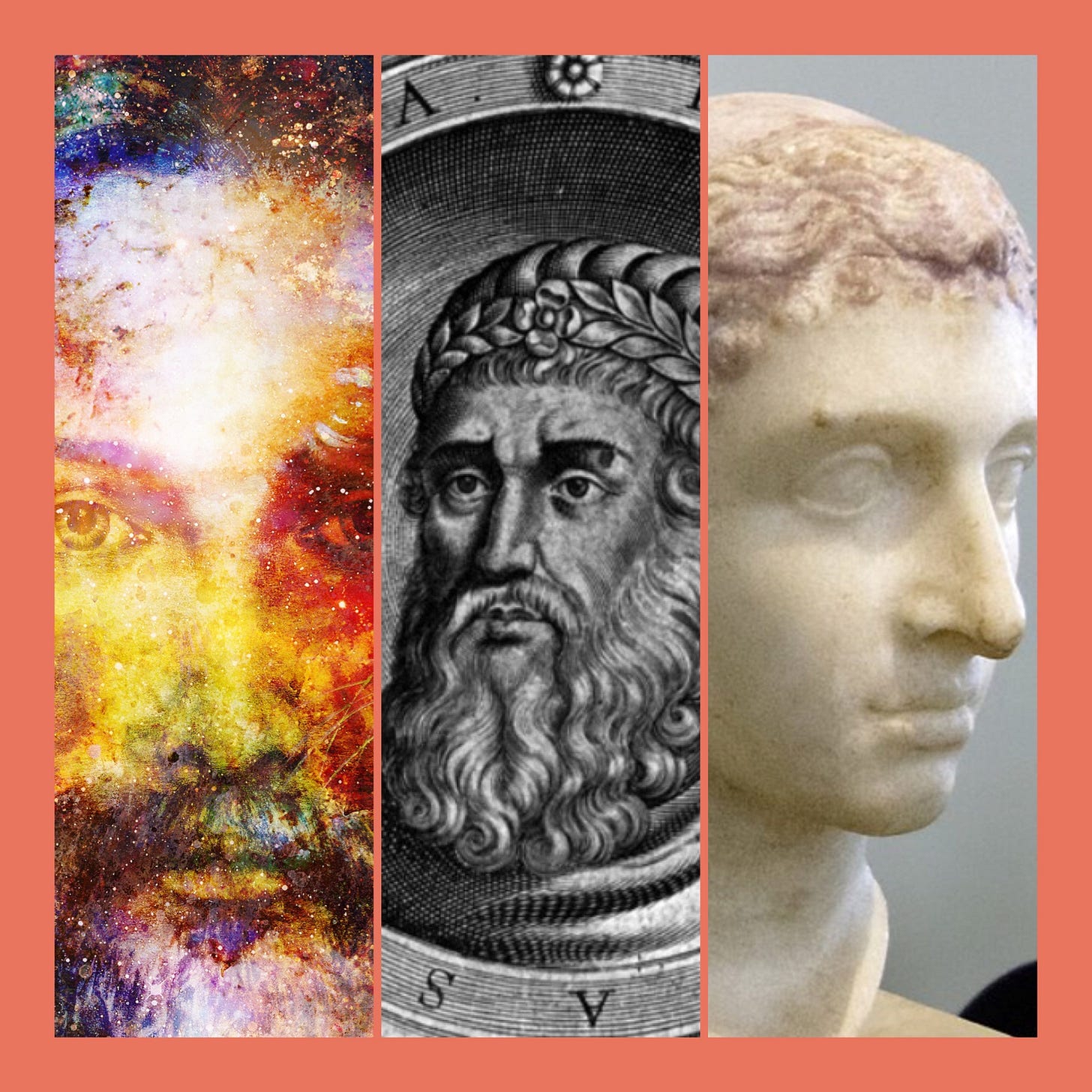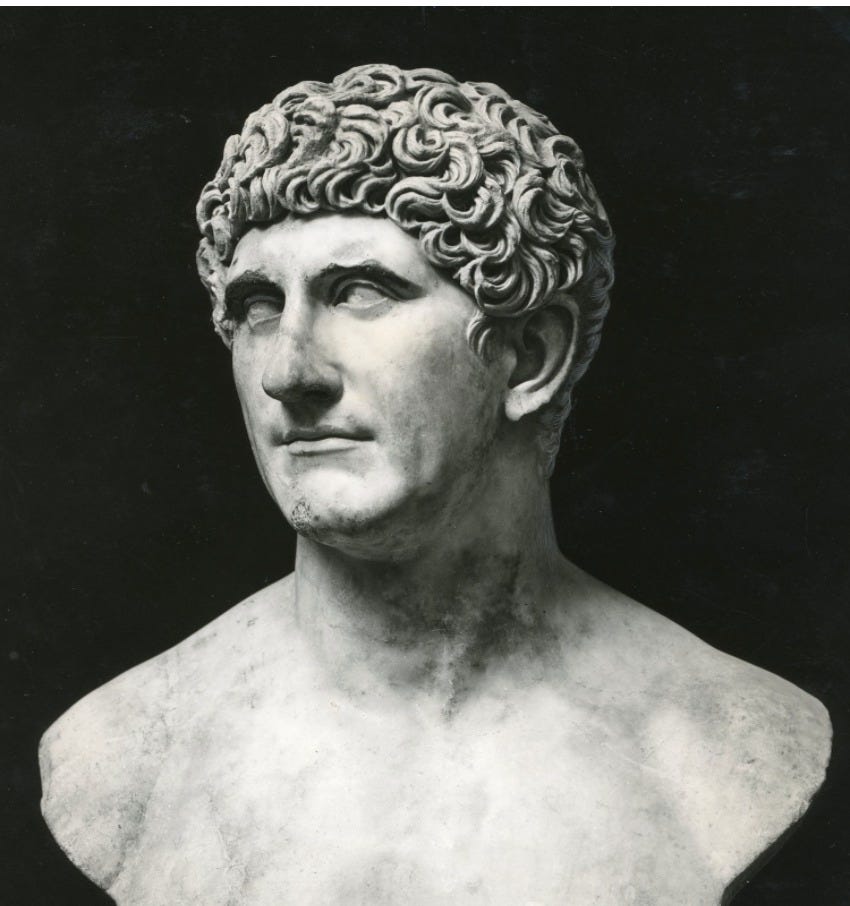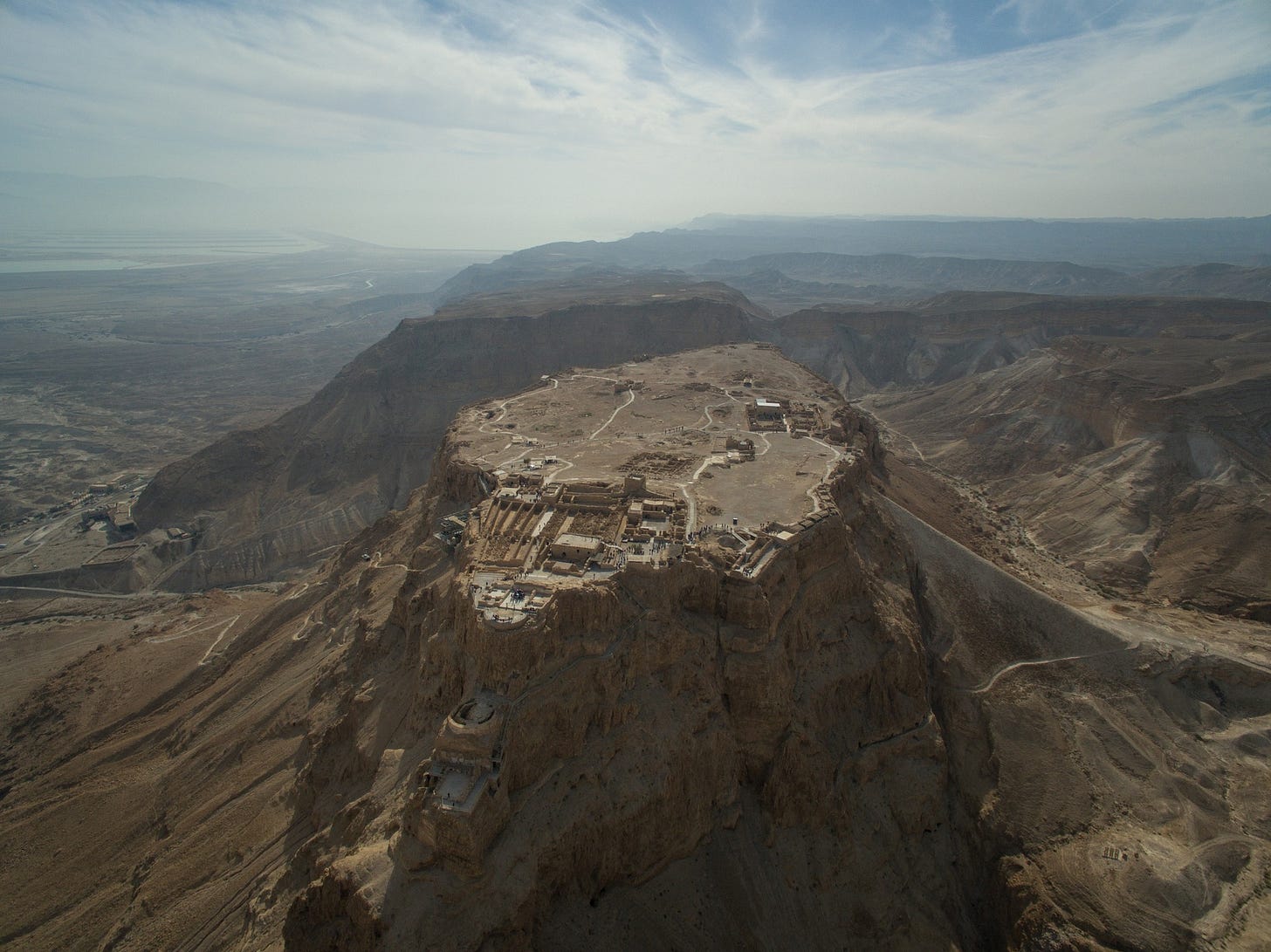Jesus, Herod and Cleopatra: A Christmas Story... about Money

Every story is a money story, and following the money trail takes me down some interesting and hilarious rabbit holes. Subscribe for free to this newsletter, and spread some laughter this holiday season by sharing “Wells $treet” with a friend. For my regular musings on finance and life, follow me on Twitter, Facebook, Instagram, and LinkedIn.
How do I combine Jesus, Herod and Cleopatra into one story?
Welcome to my brain.
Last year, with the help of supporters on Kickstarter, I created a podcast called “Top Story Tonight: Jesus!” Like my podcast that re-imagined the Mayflower, the Jesus podcast reframes “The Greatest Story Ever Told” as if modern media jumped into a time machine and went back 2,000 years to the little town of Bethlehem.

TopStoryTonightPodcast.com
The villain in the Christmas story is Herod the Great. According to the gospel of Matthew, Herod ruled Judea when Jesus was born. Matthew writes that three wise men showed up in Jerusalem and asked Herod where they could find the new King of the Jews (not a bright question to ask the current king, wise guys!).
Herod sends them on their way to Bethlehem. Then he slaughters all the male children under the age of two in that region, just in case the wise guys are right.
In my podcast, Herod finds out about this newborn king during a photo opp. Frankly, it’s my favorite scene (so if you only listen to one episode, this is the one). Herod is voiced by veteran voiceover actor Charles Hubbell, who gives the king a hilarious, Trumpian take. (In the spirit of equal political mockery, we go Clintonian in the Easter episodes with the character of Herod’s son, Antipas.)
In doing research for the podcast, I read a book called “Herod the Great: Statesman, Visionary, Tyrant” by Norman Gelb.
It’s an incredible story.
Herod was a very complicated and powerful man. He was well known throughout the ancient Roman world, a much bigger player than you’d think based on his brief story in Matthew.

This may or may not be Herod the Great... we just don’t know.
HEROD WAS NUTS
I mean, he was a total psycho, but a powerful one.
Herod's grandfather was made a Roman citizen, a great honor bestowed by Julius Caesar and one which grandson Herod inherod-ed (sorry).
Later, in 37 B.C., the Roman Senate installed Herod as King of Judea, a rare title to give a provincial subordinate. Why such acclaim? Herod the Great was totally, like, great — for Rome, that is. He had a knack for collecting taxes (and taking a cut), and he provided Rome with money and troops to fight various wars. He was especially close to Richard Burton, er, Mark Antony.

Mark Antony (Herod was his wingman)/Vatican Museum
Herod was a brilliant, brutal warrior. He was also paranoid, becoming so convinced that family members were conspiring to kill him that he killed many of them first, including a wife and several children. Even as Herod lay on his death bed, he ordered his heir executed.
His behavior was so outlandish that in Shakespeare’s “Hamlet,” the Danish Prince advises a troupe of traveling actors not to “out-Herod Herod.” Meaning, don’t overdo it.
Bad guy.
But back to the money.
HEROD WAS FILTHY RICH
How much was Herod the Great worth? In addition to making a ton of dough on taxes, Herod inherited a lot of farmland.
John Welch at BYU tried to run the numbers.
Welch estimates that Herod “collected” for himself about 1,000 talents of silver a year in various taxes and tributes. That’s around $1.7 billion in today’s silver (you really can’t compare silver today to silver then, but I just did). So he was clearly a billionaire in today’s terms.
Plus there was rent and profits from his agricultural lands, and who knows what else.
He could also raid the temple in Jerusalem when needed. Welch says, given an educated guess by the ancient Jewish historian Josephus, the temple had valuables worth 10,000 talents, or maybe $17 billion in today's silver dollars.
But Herod the Great was a great spender. He developed massive building projects. (Hmmm, a leader who’s also a real estate developer… )
Herod used much of his wealth to convert Judea from a backwater province into a major trading route, and Josephus says the king paid on time!
— He rebuilt the temple in Jerusalem, reportedly paying 18,000 workers and setting architectural records. Its beauty was renowned.
— He engineered the first artificial deep-sea port in a city he named Caesarea (after guess who?), making it a major competitor with the port of Alexandria.
— He built the compound at Masada, as well as Herodium, the largest palace in the world at the time. (Trump is not the first guy to put his name on a building.)

Masada/Rea Burla, Getty Images
PRESIDENT FOR LIFE OF THE OLYMPIC GAMES
Norman Gelb writes that many of Herod’s building projects were outside Judea, scattered across the eastern Mediterranean from Athens to Beirut. “He built theaters, temples, aqueducts, gymnasiums, marketplaces, parks, cloisters, colonnades, public baths, fountains, roads, and woods,” Gelb says. For example, “Antioch was awarded a boulevard more than two miles long, paved with polished marble along its entire length.”
Most amazing: When the ancient Olympic Games were on the brink of bankruptcy, Herod bailed them out. In return, the games named him their president for life.
He was far more popular abroad than he was at home. The folks back in Judea generally hated him and his taxes. They resented his spending on projects outside Judea, and that spending became a problem.
Gelb writes, “Substantial sums were needed to replenish his coffers, pay the tribute Antony expected of him, and fund projects that may already have begun taking shape in his mind.”
One way to replenish those coffers was to murder rivals and take their money. “Even their coffins were searched for valuables their family or friends might have tried to conceal or smuggle away,” writes Gelb. “Guards were posted at the gates of the city walls to prevent anything of value slipping through. He also took possession of many of the precious gold and silver ornaments in the temple.”
Josephus writes that at one point, Herod even went into the tomb of King David to steal “three thousand talents of silver.”
Freakin’ King David. That’s a low blow.
But there was one person richer than Herod the Great.
It was his arch rival.
MOVE OVER HEROD, MEET CLEOPATRA
The Egyptian queen was most likely the richest person in the Roman Empire. She reigned over a country which fed Rome with its wheat and covered debts that Julius Caesar ran up during a long civil war. (Caesar helped her wrestle the Egyptian throne from her brother, and he also fathered her first child.)
Later, Cleopatra helped fund an army for Mark Antony (who fathered more children) before they famously died.

Cleopatra was the rare woman to have her own coin/Univ. of Glasgow
But back to the money.
It’s estimated that Cleopatra kept half of everything Egypt produced. Pulitzer Prize-winning author Stacy Schiff writes in “Cleopatra: A Life” that the queen’s annual income “was probably between 12,000 and 15,000 silver talents.” Schiff adds that such a staggering income was perhaps “the equivalent of all of the hedge fund managers of yesteryear rolled into one.”
It was also 12 to 15 times Herod’s annual base pay before he pilfered from the temple and went tomb-raiding.
HOW RICH WAS SHE REALLY?
Schiff said that in 2018, someone ran the numbers and estimated Cleopatra’s net worth at nearly $96 billion. In 2021 dollars (inflation!), that’s $106 billion. This figure would place her at #10 on the Forbes list of richest people, right behind Warren Buffett, and the only woman in the top 10.
This is one reason she’s the subject of my next historical scripted podcast. But I’m renaming her “Kleopatra,” because she’s the original Kardashian.
HEROD AND CLEO: NOT A LOVE STORY
Cleopatra hated Herod the Great. The feeling was mutual.
A few examples:
— When Herod sought refuge in Alexandria after a military defeat, Cleopatra asked him to help her in a military campaign. He declined. She sent him off to Rome in a ship which shipwrecked off Cyprus.
— Mark Antony gave Cleopatra valuable property that had belonged to Herod, and the Judean king had to rent it back from her, which really pissed him off.
— Herod was so enraged by Cleopatra’s behavior that he started a rumor she tried to seduce him. He plotted to assassinate her and tried to convince Mark Antony to kill her.
— Cleopatra allied herself with Herod’s mother-in-law (his enemy) and tried to convince Mark Antony to punish him.
— Antony ignored both of them.
It makes “Succession” look like Sesame Street.
In the end, however, Herod won.
Octavian, who would become Caesar Augustus, defeated Antony and Cleopatra in battle in 30 B.C., and they killed themselves.
This left Herod in a tough spot. He was Antony's loyal friend. Would Octavian come for him next?
Not this guy!
Dr. Warren Carter of Phillips Theological Seminary told me in my podcast that as the situation started looking grim for Antony and Cleopatra, Herod wrote Octavian a letter which basically said, “Yes, you could throw me out of power, but here’s something to think about.” Herod points to how faithful he was to Antony, and tells Octavian that’s a rare and valuable quality. “If you give me another chance as a ruler of Judea, I’ll be the most loyal, devoted ruler, very interested in your interests, spreading your interests,” Carter paraphrases, “and [Octavian] says, ‘Okay, that sounds like a deal.’”
The new Caesar even gave Herod back all his land which Cleopatra took, plus extra.
But did Herod really win?
In his book, Norman Gelb cites Josephus' description of Herod’s last days. Brace yourself.
He died a painful and humiliating death.
The king had “ulcerated bowels” and a “transparent liquor” settling about his feet. His genitals were putrefying, he suffered convulsions, he had difficulty breathing, and his breath had a terrible stench. It went on for a long time.
Death by asp bite sounds a tad better.
MOST SUCCESSFUL OF ALL? THE BABY IN THE MANGER
Of course, both Herod and Cleopatra stand in the shadow of someone else from that era: Jesus of Nazareth, the most famous man who ever lived. He wasn’t rich, and he suffered his own terrible death, but his story is the best-selling book of all time.
The Church has been one of the most successful financial endeavors in history — perhaps the most successful — though often in ways Jesus would not approve of.

Stop me if you've heard this one.
Cleopatra had been dead at least 30 years before the baby in Bethlehem was born. And it’s not clear whether Herod was still alive, either. Matthew’s gospel says he was, but the gospel of Luke says Jesus was born during a census that took place in 6 A.D., about a decade after Herod died.
Unless there was an earlier census when Herod was still alive which we don’t have a record of.
But even the census was all about the money. It allowed Caesar to tally how many people lived in various regions so he could figure out how much to collect in taxes. And he needed the money. As news anchor “Druscilla” says in my podcast, “Those Roman legions don’t feed themselves!”
So even in the Christmas story, there’s a money story. And why not? Jesus talks about money more times in the Bible than he talks about prayer and faith… combined.
Well, that was quite a trip around the Ancient World, wasn’t it? Let me know your thoughts, and an early Merry Christmas!
”Adoration of the Shepherds” artwork by Andrew Howe, Getty Images.




